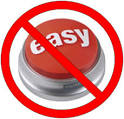Social Selling is the “Easy Button” for every sales person’s dreams of making quota.
At least if you believe 75% of what’s written about Social Selling, all you have to do is leverage LinkedIn, Facebook, Twitter Piinterest or whatever your favorite social selling platform is–and you will be successful in sales. Make connections, have a great profile, comment on articles, build your network, reach out and engage. Do this and opportunities will come flying on the door!
Interestingly, I’m now starting to see some articles from people who leverage social channels very effectively. They are saying this dream of effortless selling is really a lot of baloney.
It seems to be human nature to look for an Easy Button. We want all the rewards, but we don’t want to work for it. Ironically, we look at great athletes, great artists of all types, top performing musicians, great business people. We read of their stories of hard work, failure, learning, discipline, focus, relentless execution–we admire them for both what they’ve achieved, but what it’s taken them to get there.
Yet, turn the mirror on ourselves, look at the work, discipline, learning, failure, efforts–most go searching for the Easy button. They look for the short cuts, not willing to put in the work necessary for mastery.
Social selling, that is leveraging social engagement can be very powerful, but it is no easy button. Mastery of social engagement and social business requires mastery and masterful execution of selling fundamentals.
Prospecting is no different–we still have to engage the right customer in a meaningful discussion at the right time.
Insight is no different, we have to disrupt customers’ thinking, helping them understand their current operation can be improved.
Helping our customers buy is no different. We have to align various agendas, priorities, motives to drive consensus on the decision.
Value is no different, we have to create value in every interaction with the customer.
Social selling doesn’t eliminate the need for a well executed selling process–aligned with the customers buying process. It doesn’t eliminate the need for us to have a deep understanding of our customers, their market, industries, business drivers, dreams, goals, and ambitions.
What too many miss is there is never an easy button. There are just new tools, channels methods–any of which can help improve our effectiveness, efficiency, and impact. But all require mastery of he fundamentals.
I’ve said before, social tools can enable us to do powerful things, they can also enable us to create crap at the speed of light.

Dave;
There is an easy button, it applies to products and services that don’t need a sales professional and are sold through outlets such as Amazon.
While I see the value in connectivity, you better bring acumen, understanding, insight and value to the table…else you’ll be relegated to the competitive, commoditized, depressed margins knife fights that are almost as bad for the winner as for the loser.
Thanks for shining the blinding light of day onto the search for the mythical silver bullet.
Jim
Important article.
Scandinavians look on average 150 times per day on their smart phones, whether it is checking out email, LinkedIn, FB, Instagram, etc.
What are the statistics for Americans?
To me it seems that people are living more and more of their lives in the virtual world, and I guess that social selling is crucial in that aspect.
I am happy to realize that I am terrible at social selling today and that I have a lot to learn.
Thanks for sharing your thoughts on this important subject.
Sincerely,
Tom Erik
Tom, thanks for the note. It isn’t really about “social” it’s about mastering the fundamentals of selling. Without that, we’ll be terrible at social selling.
I’m starting to think there is no such thing as social selling, only social marketing. As you point out in this post the fundamentals haven’t changed. We’re just asking sales people to engage earlier in the buyers journey. So is that a sales role or a marketing role? I think most sales people working on commission would be happy to turn that over to marketing but then they loose the personal engagement.
Russell: Great comment. I have always been confused by the concept of social selling. It conjures up leveraging Twitter exclusively for the entire selling/buying process–restricting our communications to 140. (I’m exaggerating a little). I like the concept of social marketing–but prefer to think of them as channels of communication and engagement. Research shows that customers will engage us over multiple channels simultaneously. The buzzword for that is omnichannel. These channels include all the traditional (F2F, phone, email, social, snail mail, trade show, etc.) We are most effective in meeting and engaging the customer in every channel they choose.
I think both sales and marketing need to leverage all the channels and participate in a planned impactful way. Hope this makes sense. Thanks for the comment.